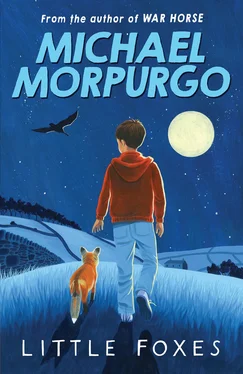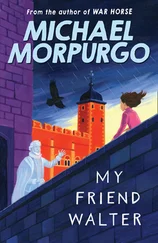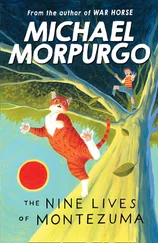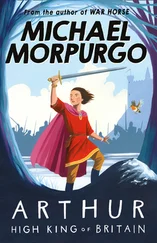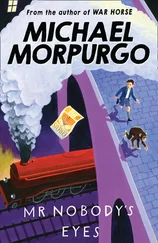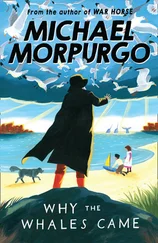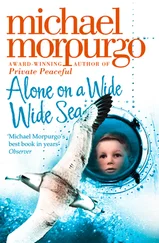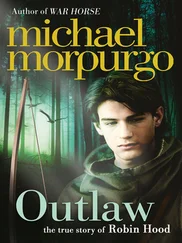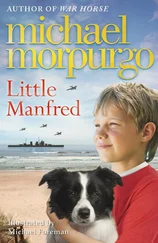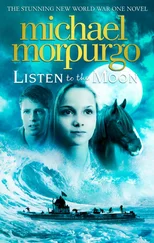‘Must be funny to be born grey and turn white after,’ he said. ‘Not a bit like an ugly duckling, you aren’t. Most beautiful thing I’ve ever seen – so you can’t hardly be ugly, can you? Course you’re not as beautiful now as you’re going to be, but I ’spect you know that. You’ll grow up just like your mother, all white and queenly.’ And the cygnet stopped preening herself for a moment and looked sideways at him. ‘Did they kill your mother too, then?’ Billy asked. ‘They did, didn’t they? What did they do it for? I hate them. I hate them. Well I’ll look after you now. You got to keep close in to the bank whenever you see anyone – don’t trust anyone, I never do – and I’ll come by each day and bring some bread with me. I’m called Billy, by the way, Billy Bunch, and I’m your friend. Wish you could speak to me, then I’d know you can understand what I’m telling you. And you could tell me a few things yourself, couldn’t you? I mean, you could tell me how to fly for a start. You could teach me, couldn’t you?’ And suddenly Billy was aware that his words were flowing easily with not so much as a trace of a stutter. ‘Teach, teach, teach, teach . . .’ Billy repeated the word each time, spitting out the T. ‘But I stutter on my T’s, always have done. T’s and P’s and C’s – can’t never get them out. But I can now, I can now. Never mind the flying, you’ve taught me to speak. I can speak, I can talk. Billy Bunch can talk. He can talk the hind leg off a horse.’ And Billy was on his feet and cavorting around the chapel in a jubilant dance of celebration, laughing till the tears ran down his cheeks. He shouted out every word he could remember that had ever troubled him and every word he shouted buried more deeply the stutter he had lived with all his life. By the time he had finished he was breathless and hoarse. He turned at last to where the cygnet had been standing but she had vanished.
Billy searched the Wilderness from end to end. He retraced the path to the canal but there was no sign of her. He found only one small grey feather left behind on the grassy floor of the chapel where the cygnet had been preening herself. This and the fact that he was still soaked to the skin from the canal was enough to convince Billy he had not been dreaming it all. As he made his way home across the darkening estate, the blue-white lights of the television sets flickering through the curtains, he practised the words and they still flowed.
He expected and received dire admonitions and warnings from Aunty May who railed against little boys in general and the price of washing powder in particular before sending him to bed early. Billy smiled to himself in his bed, hid his grey feather under the pillow and when he slept he dreamed dreams of swans or angels – he was not sure which.
When Billy’s turn came the next morning to read his page out aloud in class, he stood up and looked about him deliberately at the already sniggering children before he began. Then, using his grey feather to underline the words, he began in a clear lucid voice to read. Mr Brownlow took the glasses from his frog-eyes in disbelief, and every smirk in the classroom was wiped away as Billy read on faultlessly to the end of the page. ‘You may sit down now, Billy’ was all Mr Brownlow could say when he had finished. ‘Yes, that was very good, Billy, very good indeed. You may sit down.’ And the silence around him, born of astonishment and grudging respect soaked in through Billy’s skin and warmed him to the bone.
CHAPTER THREE
AUNTY MAY WAS ECSTATIC ABOUT BILLY’S miraculous cure from his stutter. Of course she had her own theory about the cause of this, and was not slow to voice it to anyone who would listen. ‘I’ve always said that a happy home is the best cure for all evils. That’s all Billy needed, a happy, loving home; and he’s not the first, you know. Oh no, Billy will be the fifth foster child I’ve looked after since my own boys grew up and went away. And he’s a lovely boy, one of the best I’ve had. You know, no one else would take him. Well, poor little mite, I suppose he’s not much too look at, is he? But I don’t mind that. Eats me out of house and home but we mustn’t think of that, must we? And dirty? Is he dirty? You should see the state he gets in. But there we are. Boys will be boys. After all we don’t do it for the money, do we?’
And the school too claimed responsibility for Billy’s new-found voice. Mr Brownlow was congratulated by the Head Teacher at the end-of-term Staff Meeting. ‘Quite a job you’ve done there, Mr Brownlow,’ she said. ‘Should give Billy new confidence – and the Speech Therapist had quite given up on him you know. Any idea how you managed the impossible, Mr Brownlow?’
‘It’s a slow process of course,’ said Mr Brownlow, nodding knowingly. ‘All education is you know. But I’d say patience had something to do with it. Yes, patience and faith in one’s own tried and proved methods. They love to get up and read you know. All the others were reading well, and I suppose he didn’t want to be different. I mean, who does? That’s what did it I expect. Yes, I do believe he was shamed into it.’
But the self-righteous glow at home and school soon faded as it was realised that Billy did not wish to use his new voice. He remained as silent and withdrawn as ever, speaking only when he had to and then briefly. At school he would spend hours staring at the distant trees of his Wilderness through the classroom window, chewing the end of his pencil. His confidential report read: ‘Very much below average intelligence. He always seems to want to be somewhere else. Not a good prospect.’
At home Aunty May had discovered that to threaten to send him away did indeed bring Billy back home before dark, did bring him in on time for meals. And she was not too bothered what he got up to in between times just so long as he did not get into any trouble or get his clothes dirty. ‘I’ll keep him on for a while, but I don’t like the child,’ she told the Social Worker on one of his rare visits.
‘Who does?’ came the reply.
During that winter, whenever he was not in school, Billy spent every hour of daylight in his Wilderness. He often thought of playing truant and would have done so but he knew Aunty May would have him back inside the children’s home the next day if he started that. So immediately school was over every afternoon he would make for the Wilderness, his duffle bag full of the scraps he had secreted in his pockets during school dinner. It was a hard winter that year. The ground froze in late November and the first snow came early in December. Billy saw himself as the protector of all the wild things in his Wilderness. He would spread his scraps evenly throughout the Wilderness and then watch them feed. Rampaging rooks and slow crows came wheeling in first and he would drive them away with his catapult so as to allow the smaller birds first pickings – the robins and the hedge-sparrows and the blackbirds. But he could do nothing for the barn owls, nor for the family of kingfishers. He tried. He purloined sardines from Aunty May’s larder but the kingfishers ignored them. He took some of Aunty May’s stew and put it out on a gravestone for the owls but they never came for it. He broke the ice on the canal each day so that the kingfishers could fish, but it froze over almost as he watched. He had to stand by and see them weaken as the winter wore on.
And he had not forgotten his swan; he looked for her every day and searched the canal bank for her feathers. He threw bread out onto the canal to attract her back, but there was never any sign of her.
Then one day – it was just after Christmas – the owls were no longer in their arched window in the high stone wall of the ruin and that same day he found a kingfisher lying stiff and dead by the canal. He could see it was one of the young ones for it still had a white tip to its beak and a mottled breast. The ground was too hard to bury it so he carried it reverently in his hands down to the canal, hammered a hole in the ice and slipped it into the water. Hecould not cry – he was too angry for that. As he watched it disappear under the ice he vowed he was not going to let the others die. He turned on his heel and ran back to the chapel. He picked up any loose stones he could find and made a great pile of them on the canal bank. All day he went to and fro, until he thought he had collected enough. Then he began to hurl them violently at the ice that first splintered and then began to crack and break up. By the time darkness began to fall he had opened up a twenty-foot strip of canal water for the kingfishers to dive into.
Читать дальше
